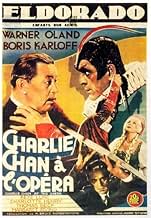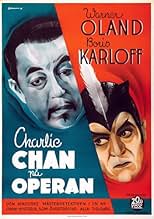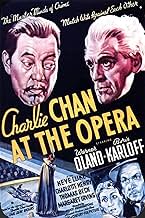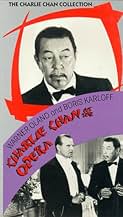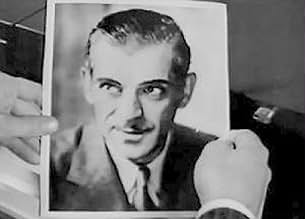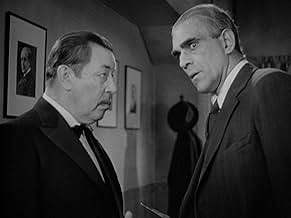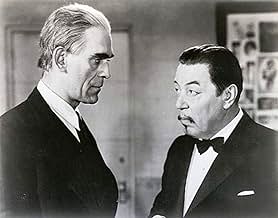NOTE IMDb
7,1/10
2,4 k
MA NOTE
Ajouter une intrigue dans votre langueA dangerous amnesiac escapes from an asylum, hides in the opera house, and is suspected of getting revenge on those who tried to murder him 13 years ago.A dangerous amnesiac escapes from an asylum, hides in the opera house, and is suspected of getting revenge on those who tried to murder him 13 years ago.A dangerous amnesiac escapes from an asylum, hides in the opera house, and is suspected of getting revenge on those who tried to murder him 13 years ago.
- Réalisation
- Scénario
- Casting principal
Larry Arnold
- Villager in Opera
- (non crédité)
William Bailey
- Detective
- (non crédité)
Charles Bancroft
- Soldier in Opera
- (non crédité)
John Bleifer
- Orderly
- (non crédité)
Stanley Blystone
- Backstage Cop Who Shoots Gravelle
- (non crédité)
Avis à la une
Given that Boris Karloff is one of my favorite actors, it's no surprise this is my favorite Charlie Chan movie. Now, of course since Karloff is here, we have to start the movie with an atmosphere akin to that of a horror film. Karloff plays an amnesiac opera singer named Gravelle. He regains his memory and escapes from a sanitarium on a stormy night to go find his daughter, whom he hasn't seen since she was a child. The police are desperate to catch Gravelle, so they call in Charlie Chan (Warner Oland).
Oland is pitch-perfect as always. Keye Luke as "Number One Son" Lee gets to have lots of fun running around in costume backstage at the opera, trying to help his father on the case. William Demarest plays a police sergeant jealous of Charlie who makes several bigoted remarks throughout the movie but comes to respect the superior detective by the end. Boris Karloff gives a terrific performance, which should come as a surprise to no one familiar with his work. He's the only actor in the entire series to be able to match Warner Oland's screen presence.
Fast pace, interesting setting, great performances, and a particularly nice atmosphere make this an exceptional entry in the always delightful Charlie Chan series. I'm not big on opera but the music written by Oscar Levant for this film is pretty good and adds to an overall excellent production. As I said before, this is my favorite Charlie Chan film and I see by many reviews here I'm not alone. It's definitely a highlight of the series, with a top-notch guest star (Karloff) and an exciting story, helped greatly by the opera backdrop and music.
Oland is pitch-perfect as always. Keye Luke as "Number One Son" Lee gets to have lots of fun running around in costume backstage at the opera, trying to help his father on the case. William Demarest plays a police sergeant jealous of Charlie who makes several bigoted remarks throughout the movie but comes to respect the superior detective by the end. Boris Karloff gives a terrific performance, which should come as a surprise to no one familiar with his work. He's the only actor in the entire series to be able to match Warner Oland's screen presence.
Fast pace, interesting setting, great performances, and a particularly nice atmosphere make this an exceptional entry in the always delightful Charlie Chan series. I'm not big on opera but the music written by Oscar Levant for this film is pretty good and adds to an overall excellent production. As I said before, this is my favorite Charlie Chan film and I see by many reviews here I'm not alone. It's definitely a highlight of the series, with a top-notch guest star (Karloff) and an exciting story, helped greatly by the opera backdrop and music.
This entry in the long-running and hugely popular 'Charlie Chan' series takes us into the distinguished - and a bit decadent - world of grand opera: famous soprano singer Lilli Rochelle, eccentric and somewhat conceited, is on the brink of hysteria because she's received a death threat for the very same day - her opening night in Los Angeles, after being away for seven years. And on exactly the same day, an amnesiac breaks out of a mental asylum after seven years; because, as soon as he sees her picture in the papers, he seems to remember something...
Meanwhile, we learn that second soprano Anita Barelli is madly jealous of Lilli - not only because she's the star, but mainly because she's got an affair with her husband! And then there's a young couple hanging around backstage all the time, for some reason trying by all means to get to Lilli - but then the opera performance starts, and very soon a murderous drama REALLY worthy of any opera libretto begins to take its course...
Except for the comic relief provided by Lee Chan and the cops, this film is pretty earnest, at times dramatic, if not even melodramatic; but we must undoubtedly admit that Boris Karloff probably plays one of the BEST roles of his life here: mad, full of hatred, and then again pitiful and sympathetic... While in other movies he usually only showed parts of his full acting range at a time - here he demonstrates them all in one!
Meanwhile, we learn that second soprano Anita Barelli is madly jealous of Lilli - not only because she's the star, but mainly because she's got an affair with her husband! And then there's a young couple hanging around backstage all the time, for some reason trying by all means to get to Lilli - but then the opera performance starts, and very soon a murderous drama REALLY worthy of any opera libretto begins to take its course...
Except for the comic relief provided by Lee Chan and the cops, this film is pretty earnest, at times dramatic, if not even melodramatic; but we must undoubtedly admit that Boris Karloff probably plays one of the BEST roles of his life here: mad, full of hatred, and then again pitiful and sympathetic... While in other movies he usually only showed parts of his full acting range at a time - here he demonstrates them all in one!
According to my sources, there seems to be a slight disagreement on the singing in this movie. Denis Gifford's Karloff bio says that Karloff did his own singing (and he could have; he was a fair baritone and sang in the Dulwich College chorus). Oscar Levant's autobiography claims that Karloff was dubbed. Oscar Levant, however, seems to have been writing from an unreliable memory, as he gets other details wrong including the movie synopsis. There are three singing voices heard in the movie: soprano, tenor, and baritone. The tenor was never seen, but was heard onstage while Chan and Number One Son were backstage. Both actresses playing sopranos were synching to the same recording. Karloff may also have been synching to a recording, but it could well have been his own, both for the reason given above and because Levant's opera was written for the movie--no previous recordings existed at the time, and why would the studio have spent extra money on a second singer for a B-budget film when they already had someone on the film who could handle the baritone singing? (Even the Faust costume worn by both baritones onstage was secondhand--it was first worn by Lawrence Tibbett in "Metropolitan", filmed earlier in 1936!)
My favorite of the Warner Oland Chans, Charlie Chan At the Opera, is an excellent entry in the series. It begins like a horror film, on a stormy night, as Boris Karloff overcomes a guard in a sanitarium, then escapes. We are then introduced to a motley group of characters, including a temperamental opera diva, who has been recieving threatening notes, then Charlie and son arrive, and soon the action moves to the opera house, where the film remains. Karloff turns up backstage, where he is hiding, above the dressing rooms, and we soon learn the truth: he is a famous singer who had supposedly died in a fire but escaped, and has been suffering from amnesia ever since. He has only recently begun to remember who is, and is now looking for the person who tried to kill him.
There's a lot of plot in this film, and it isn't brilliantly developed. What makes the movie so watchable is the acting, which is uniformly good (and in Karloff's case outstanding); the music, courtesy of Oscar Levant, who wrote the score; the set design, which is marvelous; and occasionally the dialogue, which is often funny. Director Bruce Humberstone juggles all these elements masterfully, making the movie hum. Karloff brings gravitas and real menace to his part, and elicits pity as much as terror. Oland is his usually Buddha-like self, delivering his fortune cookie homilies with aplomb. William Demarest is the Irish cop this time around. As was so often the case with murder mysteries, a suggestion of the supernatural helps the mood enormously. Karloff isn't quite the phantom of the opera, but people react to him as if they've seen a ghost, since they all assume that he's dead.
The movie is a very accomplished piece of work. Its theatre and backstage atmosphere give it the feeling of a show within a show, and it's a pretty good one whichever way you look at it.
There's a lot of plot in this film, and it isn't brilliantly developed. What makes the movie so watchable is the acting, which is uniformly good (and in Karloff's case outstanding); the music, courtesy of Oscar Levant, who wrote the score; the set design, which is marvelous; and occasionally the dialogue, which is often funny. Director Bruce Humberstone juggles all these elements masterfully, making the movie hum. Karloff brings gravitas and real menace to his part, and elicits pity as much as terror. Oland is his usually Buddha-like self, delivering his fortune cookie homilies with aplomb. William Demarest is the Irish cop this time around. As was so often the case with murder mysteries, a suggestion of the supernatural helps the mood enormously. Karloff isn't quite the phantom of the opera, but people react to him as if they've seen a ghost, since they all assume that he's dead.
The movie is a very accomplished piece of work. Its theatre and backstage atmosphere give it the feeling of a show within a show, and it's a pretty good one whichever way you look at it.
Murder, mayhem, and a load of Chinese maxims flood an opera house in San Francisco where a star baritone and a star diva are killed. The police are on the case and they also have asked for the help of Honolulu detective Charlie Chan. This is a real entertaining, fun film to watch. Warner Oland goes through one Chinese proverb after another to remain enigmatic, and yet shed some light on the proceedings. Oland does a nice job as Chan and adds subtlety to not so subtle occurrences. A mad man has escaped from an asylum and has hidden himself within the opera house for reasons unknown to the police. The man is played by none other than the great Boris Karloff. Karloff is a bit restrained in his performance but does add some menace and depth. Watching Karloff sing baritone(with someone's dubbed voice) is quite a sight! Keye Luke is back as Chan's over-eager beaver son. William Demarest plays a somewhat annoying policeman who discredits Chan's abilities really for being an Oriental. The subtle prejudicial undertones of his actions are a bit disturbing. A good script with plenty of humour and lots of Chan!
Le saviez-vous
- AnecdotesBenson Fong, who appears as an extra during the opera scenes, later returned to the series to play Tommy Chan, Charlie's #3 Son.
- GaffesWhen they characters are all gathered in the dressing room after the murders and they are questioning Childers, he says he knew Madame Barelli well. What he actually meant to say Madame Rochelle (or Madame Lilli as she was being referred to).
- Citations
Mr. Arnold: I'm stage manager here and this opera's going on tonight even if Frankenstein walks in.
- Crédits fousOpening credit: Warner Oland vs. Boris Karloff
- ConnexionsEdited into Who Dunit Theater: Charlie Chan at the Opera (2021)
- Bandes originalesCarnival: March Funebre
Music by Oscar Levant
Meilleurs choix
Connectez-vous pour évaluer et suivre la liste de favoris afin de recevoir des recommandations personnalisées
- How long is Charlie Chan at the Opera?Alimenté par Alexa
Détails
- Durée
- 1h 8min(68 min)
- Couleur
- Rapport de forme
- 1.37 : 1
Contribuer à cette page
Suggérer une modification ou ajouter du contenu manquant

